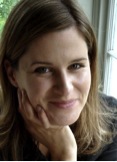
Lisa Shannon’s plan was to be in Paris for her 30th birthday. Instead, she caught strep throat and had to cancel her trip. About a week before her birthday, she wound up sprawled on her couch watching the "Oprah Show," where she learned about the conflict in Congo. In her report, journalist Lisa Ling called Congo “the worst place on earth . . . and the most ignored.” Lisa was dumbfounded. The deadliest war since World War II had been raging for more than 10 years. The same guys responsible for the Rwandan genocide were still out there killing people, and she had never even heard of it? So she did what was suggested on the show: She signed up to sponsor a “sister” through Women for Women International.
But what she had seen in Ling’s report continued to haunt Lisa. On her birthday, she was in an airport and spotted O, The Oprah Magazine. They had run a companion story with personal accounts of Congolese women. One woman had written about an attack. She was being dragged away to the forest, the militia was about to rape or kill her, so she begged for her life. One of the militia responded, “Even if I kill you, what would it matter? You are not human. You are like an animal. Even if I killed you, you would not be missed.”
Lisa just sat in the airport crying, thinking that in many ways the world agrees with that guy. She knew she had to figure out some way to send the opposite message: These people do matter. Lisa tried to rally her friends into throwing a fundraising party or doing a walk . . . anything. But none of them had heard of Congo, and they thought there surely must be a reason no one was talking about it to the extent that they were talking about Darfur. So Lisa decided she would have to do it alone. All she could think of was running. Since many people make fundraising runs, it would have to be bold enough to get the attention of her friends and family. So she set a goal: She would run a 30-mile trail to raise 30 sponsorships for women in Congo through Women for Women International.
Lisa didn’t consider herself to be a good runner, and she had never done any public speaking or fundraising before. But she figured the only qualification she needed was that she cared, and she decided to figure out the rest as she went along. On her first lone run, Lisa raised 80 sponsorships (about $28,000). We asked her, “Did you succeed because you are compelling and charismatic and just so darned good at all of this?” No, she replied. The success stemmed simply from that fact that she had created an opportunity for people to learn about what was happening in Congo, and she had given them a way to do something about it.
Word spread, and before long, Lisa was at the helm of her new organization: Run for Congo Women. In the second year of Run for Congo Women, people participated in the run by themselves or in groups in 10 states and four countries. They received press coverage in Runner’s World, Fitness Magazine, and O, The Oprah Magazine. And the runs have continued.
Thousands have run, walked, baked, swum, hiked, and biked for Congo’s women. Lisa’s appearance on the Oprah Show in 2009 spread the word to millions of new people. Women for Women International’s Congo program grew by 100 percent because of the "Oprah Show," which doubled the number of women being helped. More than 6,000 Congolese women were enrolled in the program as a direct result of the show. Women for Women International’s Congo program now serves more than 12,000 women per year. As a stand-alone project, Run for Congo Women has raised more than $600,000 and has sponsored more than 1,200 women in the Congo.
But to Lisa, there has been no greater sense of success than going to Congo and meeting face to face the women her organization has sponsored. She was shocked at how much they depend on personal connections with women around the world. They carry letters from their American “sisters” in pouches, hung around their necks, tucked under their shirts, like their most prized possessions. Just because someone cared and reached out to them as human beings. Of course they had endless stories of the atrocities they’ve lived through. But they also had endless success stories of the Women for Women program— stories of buying land, protecting their families, building businesses, and becoming community leaders. What Lisa heard in almost every women’s group was, “I feel like a human being again.”
This profile and many others were compiled for The Enough Moment, a book by John Prendergast and Don Cheadle about engaged citizens – known and unknown, in the U.S. and abroad – who are mobilizing to help end genocide, rape, and the use of child soldiers in Africa. Visit the Enough Moment Wall to hear people describe their “Enough moment” and to upload a video, photo, or written testimonial of your own.

